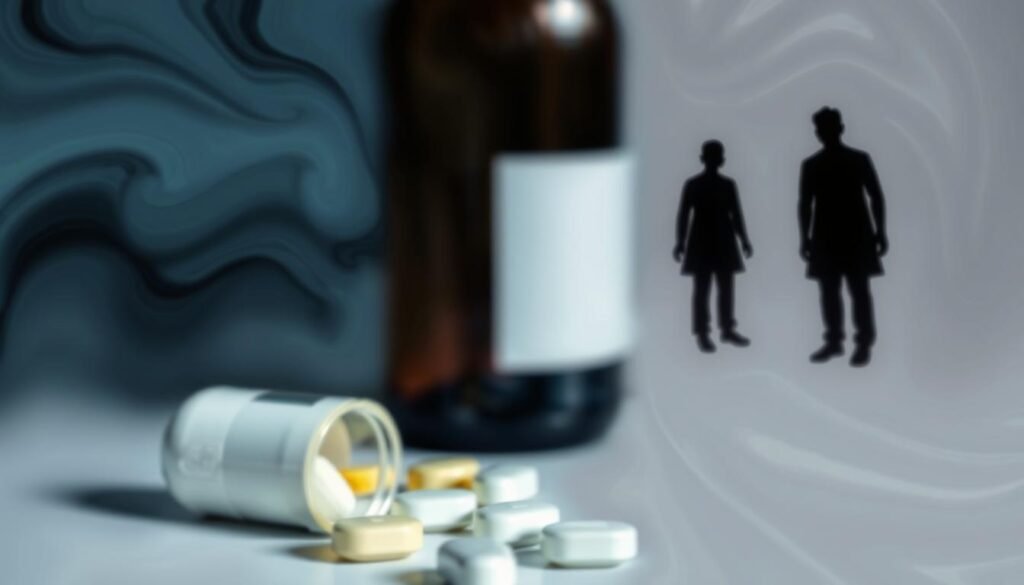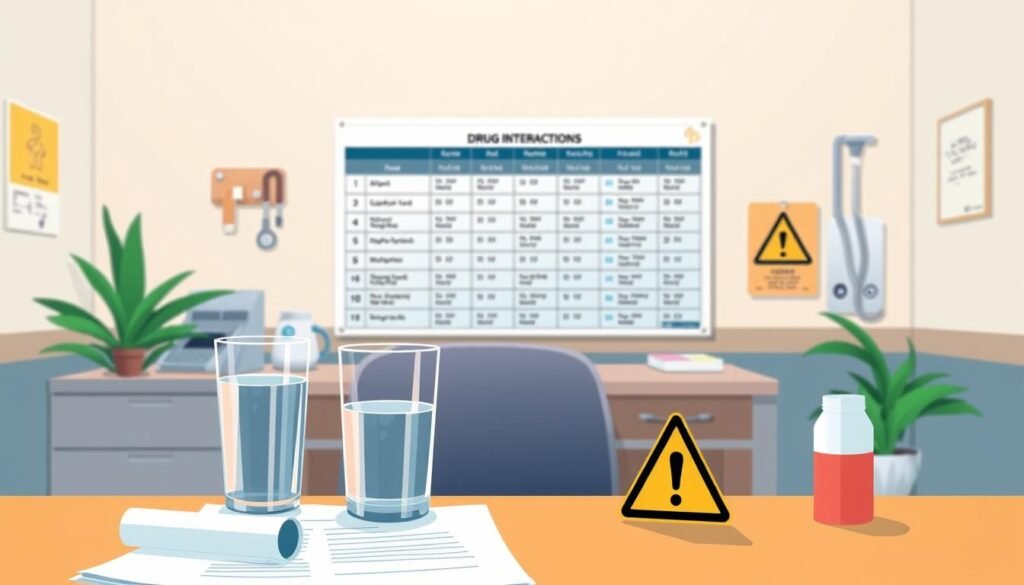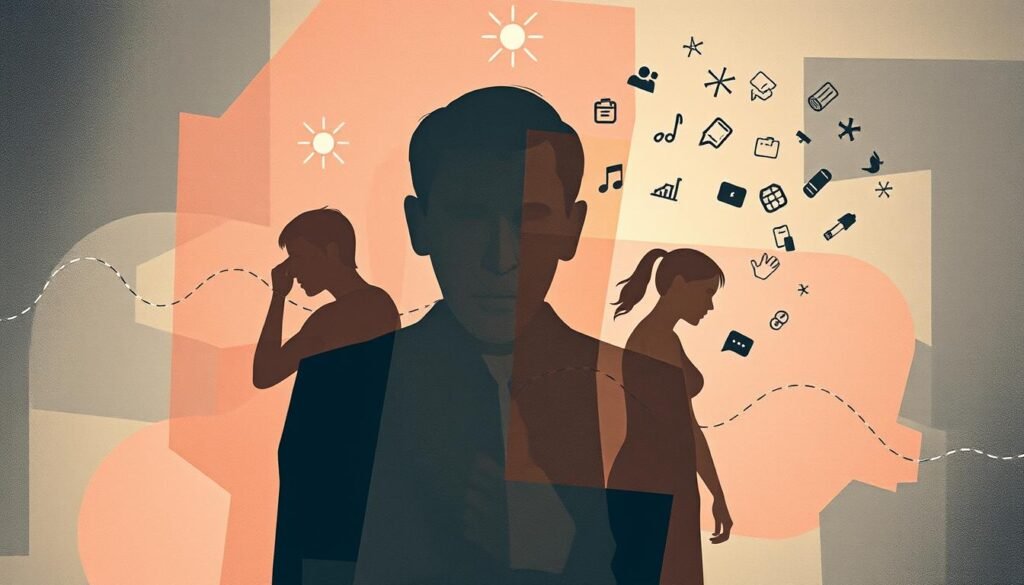Did you know mixing Lexapro with alcohol could harm your mental health? Studies show about 10% of Lexapro users feel more anxious and depressed when drinking. This fact highlights why knowing the risks of combining these substances is crucial. We need to be careful to avoid negative impacts, especially when considering can you drink while taking lexapro for.
Lexapro, also known as escitalopram, fights anxiety and depression. But, mixing it with alcohol can be dangerous for your mental health. This article will explore how alcohol affects Lexapro’s power. We’ll also present safety guidelines for those drinking while undergoing treatment. It’s important to understand anxiety management to make good decisions.
Key Takeaways
- Mixing Lexapro with alcohol can worsen anxiety and depression.
- Some might drink moderately safely, but it’s still risky.
- Doctors generally recommend avoiding alcohol to prevent serious side effects.
- Knowing about lexapro alcohol interaction helps treatment work better.
- Always talk to a healthcare provider before drinking alcohol on Lexapro.
Understanding Lexapro and Its Use
Lexapro, or escitalopram, is a type of SSRI medication. It’s primarily used for treating anxiety and depression. It focuses on major depressive disorder and generalized anxiety disorder. By boosting serotonin in the brain, it improves mood and lowers anxiety levels. This makes it a key option for those seeking help.
Those on Lexapro find it effective. Yet, it’s important to use it wisely, especially with alcohol. Mixing the two can cause serious problems, making anxiety and depression worse. Sometimes, it might even require changing the treatment plan. That’s why doctors often advise against drinking while on Lexapro.
To make the most out of your medication, knowing how to use it safely is crucial. Always talk to a healthcare professional for advice. For more information on mental health and medication, visit Transcend Recovery Community.
| Medication | Uses | Risks of Mixing with Alcohol |
|---|---|---|
| Lexapro (Escitalopram) | Depression and Anxiety Treatment | Increased symptoms, complications in treatment |
| SSRIs in General | Mood Stabilization | Potential for enhanced side effects |
The Risks of Mixing Lexapro and Alcohol
Mixing Lexapro and alcohol can be harmful to your health. Combining them can make side effects like dizziness, extreme tiredness, and poor coordination worse. This is especially risky for anyone dealing with mental health issues.
Drinking alcohol while on Lexapro increases dangers. Studies show that alcohol can make depression and anxiety symptoms worse. This can make the medication less effective. It might lead people to act in ways they usually wouldn’t, hurting their mental health even more.
There are also big health risks. Mixing the two can harm important organs like the liver and heart. Too much alcohol can lead to liver damage, including severe liver failure. It can also raise the chance of getting heart disease, including issues with heart valves and heart attacks.
Another major concern is the risk of suicidal thoughts. People facing mental health challenges might use substances more often. The mix of Lexapro and alcohol can lead to more thoughts of suicide. It’s important for friends and family to know this risk.
| Risk Factor | Possible Consequences |
|---|---|
| Dizziness and Confusion | Impaired judgment and increased risk of injury |
| Fatigue | Extended periods of extreme tiredness affecting daily life |
| Liver Damage | Liver disease and potential liver failure |
| Heart Strain | Increased risk of heart disease and heart attacks |
| Suicidal Thoughts | Increased risk of self-harm and suicidal tendencies |

Why Doctors Recommend Avoiding Alcohol with Lexapro
Doctors stress not drinking alcohol while on Lexapro. Following advice on Lexapro and alcohol helps improve mental health treatment. Alcohol can make Lexapro less effective, increasing depression and anxiety symptoms.
Many dealing with depression or anxiety turn to alcohol for comfort. Those with alcohol use issues are twice as likely to misuse it if they also have mental health problems. This risky behavior can worsen their condition, making them drink more to feel better.

Drinking alcohol can lead to more negative side effects. It affects how well Lexapro works and can cause serious issues. Mixing alcohol and this medicine can make you feel very tired, sick, and even have dangerous thoughts.
Alcohol also harms liver function, a vital concern for mental health patients drinking more over time. This can lead to addiction, especially with SSRIs like Lexapro. It’s important to talk to doctors about safe practices during treatment.
To sum up, mixing alcohol with Lexapro carries big risks. Following doctor’s advice on Lexapro and alcohol helps prevent problems and improves mental health care.
Common Side Effects of Lexapro
Lexapro, also known as escitalopram, treats depression and anxiety. Its benefits come with some side effects. These include feeling dizzy, sleepy, tired, and having stomach issues like nausea. Some people also notice a drop in sexual desire or changes in how much they eat.
When it comes to treating anxiety, be careful with alcohol. Alcohol can make side effects worse, such as making you feel even dizzier or more tired. This can be risky, especially if you need to be fully alert for daily tasks.
Talking openly with your doctor about side effects is critical. Regular check-ups can help tackle the big side effects and might change your treatment plan. Knowing the common side effects of Lexapro and understanding alcohol’s impact can make your treatment safer.

| Common Side Effects | Severity | Advice |
|---|---|---|
| Dizziness | Moderate | Avoid driving until you know how Lexapro affects you. |
| Drowsiness | High | Consult your doctor about dosage; don’t mix with alcohol. |
| Nausea | Moderate | Take medication with food to alleviate symptoms. |
| Fatigue | High | Prioritize rest and discuss with your healthcare provider if it persists. |
| Decreased Libido | Moderate | Talk to your doctor; alternatives are available. |
Can You Drink While Taking Lexapro for Anxiety
Wondering if you can drink alcohol while taking Lexapro for anxiety needs careful thought. Moderate drinking might seem okay, but be careful. Alcohol can affect how well Lexapro works and make side effects worse.
Potential Impact on Mental Health
Drinking alcohol can make mental health issues worse. This is true for those with anxiety or depression. It might cancel out Lexapro’s positive effects.
Drinking can also make you less sharp and coordinated. This could make doing everyday things dangerous. You may feel sleepy or dizzy, affecting your daily responsibilities.
Guidelines for Moderate Drinking
Thinking about drinking while on Lexapro means you should be cautious. You should:
- Keep your alcohol intake low.
- Drink slowly, preferably with food, to lessen side effects.
- Watch for any changes in how you feel or your anxiety levels.
- Talk to a healthcare professional for advice tailored to you.
Keeping an eye on your mental health is key. If you see any negative changes, get help. Being aware of the risks lets you make better choices about drinking. For more, see safety guidelines on mixing Lexapro and.
Lexapro Alcohol Interaction: What You Need to Know
Knowing about lexapro alcohol interaction is critical for those on this medication. Lexapro treats depression and anxiety disorders. It’s vital to know the risks of mixing Lexapro with alcohol to make smart choices.
Mixing Lexapro and alcohol can lead to more side effects and lower the drug’s effectiveness. Both can affect mood, thinking, and movement. Those with anxiety or depression may turn to alcohol more often, making things worse. Drinking with Lexapro can cause more anxiety and deepen depression.
Not everyone feels bad effects from drinking while on Lexapro. Some might feel only mild effects yet it’s key to watch out. Drinking more can lead to relying on alcohol to feel better.
Here’s what can happen when you mix these two:
| Possible Effects | Description |
|---|---|
| Increased Anxiety | Alcohol can make anxiety worse, messing with Lexapro’s goal. |
| Exacerbated Depression | Mixing them can make depressive thoughts worse. |
| Drowsiness | Both can make you much more sleepy. |
| Liver Problems | They can both be hard on your liver. |
| Higher Risk of Alcoholism | Turning to alcohol to deal might lead to addiction. |
In short, Lexapro and alcohol together can be risky. Put your mental health first by finding other ways to cope like exercise, hobbies, or therapy. Always talk to your doctor before drinking while on Lexapro to stay safe and keep the medicine working well.
Safe Alcohol Consumption: Dos and Don’ts
Knowing how to safely drink alcohol on medications like Lexapro is key for good health. Experts agree that following safe alcohol limits with Lexapro can lower the risks of mixing alcohol with antidepressants. Yet, people must consider their own health needs first.
Recommended Alcohol Limits While on Lexapro
Being aware of how much alcohol to drink on antidepressants is important. Studies say it might be okay for women to have one drink a day, and men two. This careful approach helps avoid worsening side effects like feeling sleepy or dizzy, and having trouble moving. Still, it’s important to know how your body reacts to alcohol.
Importance of Consulting a Healthcare Provider
Talking to a healthcare provider before you drink alcohol is a smart move. A healthcare expert can give advice based on what medicines you take and your health past. This conversation helps you understand how alcohol could change the way your treatment works, especially with Lexapro. For extra advice, WebMD is a great resource.
| Alcohol Consumption Category | Women | Men |
|---|---|---|
| Recommended Daily Limit | 1 Drink | 2 Drinks |
| Potential Risks | Exacerbated side effects | Exacerbated side effects |
| Consulting Health Provider | Essential | Essential |
Being smart about drinking alcohol on Lexapro is vital. By keeping these rules in mind and talking to healthcare pros, you can safely enjoy drinks.
Long-Term Consequences of Mixing Lexapro and Alcohol
Continuous use of alcohol and Lexapro can pose major health risks. These risks especially affect mental health over time. This mix may make anxiety and depression worse, making it hard to manage these issues.
It can be hard to tell the cause of one’s problems when symptoms overlap. Drinking while on Lexapro might lessen its positive effects. This can increase feelings of sadness or anxiety. This mix may also lead to addiction, making mental health and substance use problems worse.
Ongoing alcohol use can disrupt the body’s chemical balance. This may change the treatment needed for chronic conditions. Those who drink while on Lexapro might need extra treatment. This is due to issues caused by both substances.
If you’re thinking of drinking alcohol on Lexapro, it’s key to understand the long-term effects. Knowing how they interact can help you make better choices for your mental health and lifestyle.
Conclusion
In summary, mixing Lexapro and alcohol calls for moderation with Lexapro. While some may manage drinking moderately, the risks cannot be ignored. These include worse side effects and less benefit from the medication.
It’s vital to talk openly with doctors about the use of Lexapro and alcohol. Sharing any negative changes or increased feelings of anxiety and depression is key. Knowing the effects of mixing these can help people make better decisions for their mental health.
Taking care of mental health means being mindful of all factors, including alcohol. Armed with knowledge and support, people can safeguard their health while managing their medication well.